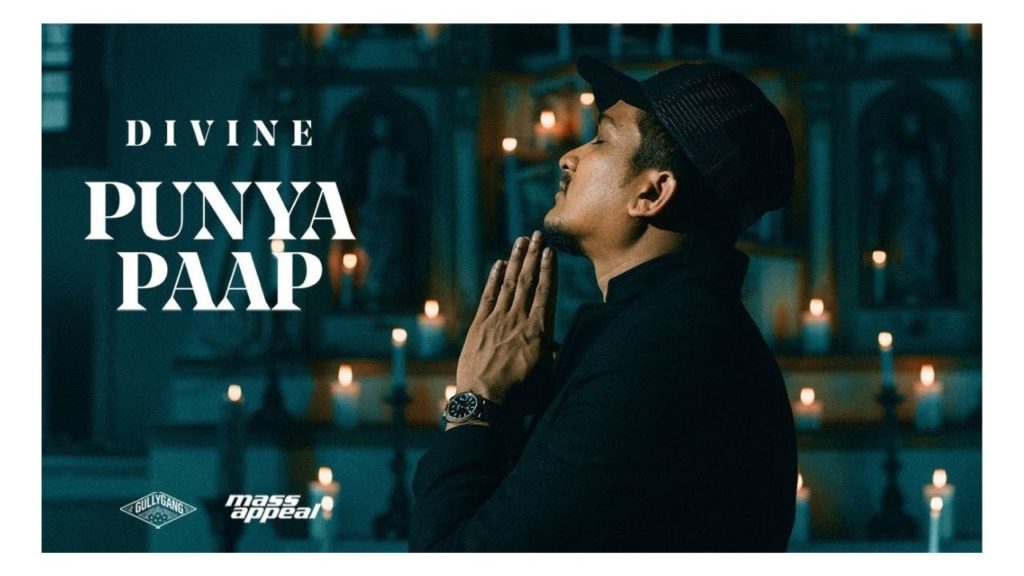When hip-hop phenom Kendrick Lamar won The Pulitzer Prize for music in 2018, it asserted to the world something that us hip-hop devotees have always known: at its heart, great hip-hop is great poetry.
Indian hip-hop icon Divine AKA Vivian Fernandes epitomizes this bond in his sophomore album Punya Paap. Perhaps one of the most accurately named albums released in recent years, it navigates the nuance of a difficult, downtrodden life that demanded sin and sacrifice at every turn.
Beyond his beats, Divine’s wordplay is what made him synonymous with underground hip-hop in this country. Punya Paap is no exception. Rhyme, rage and revelation come together in almost every track.
“Bas bas ho gaya abhi sirf parivaar mera
Pehle shani tha ab har din shanivaar mera
Dentist se zyaada game mujhe daant de raha
Vaccine yeh bars aur main sabko shot dera”
- 3:59 AM
Tu daddy pe tha main Maggi pe tha
Tu skinny mein hai main baggy mein tha
Yeh rap aur hip-hop mera planning nai tha
Main paise kamane ke planing mein tha
Ganda ya saaf mangta anaaj
Jab doodh nahi ghar pe
Tab kuchh nahi aata hai yaad
Kya hai punya aur kya hai paap
- Punya Paap
The gospel of his slum-to-star story forms the core of Divine’s artistic oeuvre, and this time, he has dug deeper to chronicle personal injustice, heartbreak and vindication. While 3:59 AM kicks off with kick-to-the-gut verses about how he made it in the business, his elation is short-lived as he pans into Mera Bhai. Memorializing a bond with an inseparable childhood friend, he writes a eulogy to brotherhood:
Sheeshe ke saamne hum haath ghumate
Gaano ko ratta fir kar kar ke gaate
Joote bhi same hum ek jaisa laate
Gang bhi same hum dono banate
Dushman bhi same hum dono banate
Bhookey pet bhi sone nahi jaate
Surreptitiously, almost undetected, the verse swerves, going from camaraderie to catastrophe:
Kyun khud main vishwaas
Khud se hi pyaar
Yeh saanpo ke jungle mein khud mere saath
Khud mera khaas
Yeh saanpo ke jungle mein khud mere saath
Khud mera khaas
Khud mera bhai
Insaan dhokebaaz
Main khud mera bhai
Insaan dhokebaaz
Betrayal descends, his brother has forsaken him, he can count on none but the man in the mirror.
The animated music video for Mera Bhai, ideated and directed by Debjyoti Saha, is equally powerful and harkens the imagery of death and burial that find apotheosis in the album’s title track.
In Walking Miracle, Divine collaborates with Grammy winning singer-songwriter Cocoa Sarai and hip-hop demigod Nas to remember every sky-high wall he has had to scale. He pays tribute to Nas with the latter’s unforgettable “Sleep is the cousin of death”, propelling himself into the status of both rap architect and acolyte.
In Satya, Divine goes hard and samples the iconic “Goli maar bheje mein” from Ram Gopal Verma’s cult classic Satya. This track predictably features the most gangsta’ sound on the album and showcases some of Divine’s cleverest poesy:
Patra tod ke nikle ISRO ki tarah
Chhaap ke nahi kahin dusron ki tarah
Vastav hai kala meri lifestyle ki tarah
Rolly range hoon main chakri ki tarah
…
Topi nikale to church ka ladka
Topi pehna de phir karte lafda
Load nahi lete apun duniya bhar ka
Nange pair se seedha lounge mein chair
Paper ke pakad mein duniya bhel
Chase karte hum sirf gandhi ko
…
Uniquely in this album, Divine also flutters into variant brands of “fun”. He displays romantic vulnerability in Rider (feat. Lisa Mishra), and drops an absolute club banger with Mirchi (feat. Stylo G, MC Altaf & Phenom). The latter, breaking it down with Jamaican–English reggae fusion soundsmith Stylo G has naturally become the most popular offering from the album, garnering over a 100 million views on Youtube. Created with the intention to attract more people to Indian hip-hop, Divine struck popular gold with this one.
Disco Rap pays a slick tribute to Divine’s love for the retro sound, and is emblematic of the sonic diversity the rapper is constantly willing to explore. And despite all the flexing, he reaches a point of resigned exasperation in Shehnai:
Zindagi meri shehnai
Hum baje in raston mein
Jaise hum shehnai
Iss dard ko to sehna hi
Poori zindagi bas dard dard dard
Humne jhela hi
Amidst the diss:
Yeh diss rappers mumma ke sofa pe hi
Insta ke fans inke show par nahi
And the gratitude:
Mere dost mere headphones pe sun’ne wale
GG ke soldiers ko shukriya
He lets slip a sigh of weariness borne of walking unfamiliar, battered roads to respect and recognition.
In the album’s eponymous track, Divine goes to confession and we become his church. It is best described in his own words:
“Punya Paap is a very personal offering that gives a perspective of my life, the good, the bad and the ugly. Family, God and music have been my fortune and blessing (punya). Parallelly temptations and vices (paap) have also been around me in the form of money, fame, wrong company. The title track of the album is an authentic reflection of my life and how I want to reconstruct it from hereon. Whether I want to continue to partake in the unabashed drama or whether I want to seek redemption, the pandemic has presented this choice to me.”
Bringing his faith to the fore, he confronts and cheats a spiritual death, is made new by poetry of his streets and absolves himself of any sins he was led to by the deprivation he inherited in birth.
The track had its prelude in Divine’s previous album’s title track Kohinoor:
Pepsi se bade huve jo thailiyon mein aate
Saatvi se saat dost
Abhi bhi mere sath hain
Abhi bhi karte punya
Abhi bhi karte paap hain
This builds his music into an artistic universe. He is building on a narrative that expands as he navigates stardom, works through a new brand of pitfalls and recreates himself in the guide of evolution.
Punya Paap owes it’s shimmer not just to Divine, but also to stellar producers (iLL Wayno, Byrd, Shah Rule) and collaborations (Nas, Cocoa Sarai, Dutchavelli, Stylo G). Looming large is the scalpel-sharp vibe sculpted by Guwahati-based Rajdeep Sinha aka Stunnah Beatz (“3:59 AM” “Shehnai”). Gully Gang producer Karan Kanchan plugs into trap and bass, offering ominous lo-fi murmurs on Mera Bhai and put-your-hair-down hooks in Disco Rap.
With this album, Divine represents his community, gives himself due props, and remains steadfast as a man who tells the truth. He has outpaced the standards he set himself with Kohinoor, and ekes out a balance between righteous resentment (at the world) and well-deserved pride (in oneself).
Verdict:
“Doosri album nahi meri doosri yeh kitab”: Divine oscillates between the sublime and the simple in his second album








